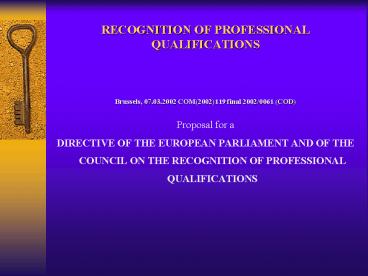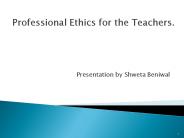RECOGNITION OF PROFESSIONAL QUALIFICATIONS - PowerPoint PPT Presentation
1 / 23
Title:
RECOGNITION OF PROFESSIONAL QUALIFICATIONS
Description:
a) an attestation of competence issued by a competent authority in the home ... Attestations of competence or evidence of formal training shall satisfy the ... – PowerPoint PPT presentation
Number of Views:58
Avg rating:3.0/5.0
Title: RECOGNITION OF PROFESSIONAL QUALIFICATIONS
1
RECOGNITION OF PROFESSIONAL QUALIFICATIONS
- Brussels, 07.03.2002 COM(2002)119 final 2002/0061
(COD) - Proposal for a
- DIRECTIVE OF THE EUROPEAN PARLIAMENT AND OF THE
COUNCIL ON THE RECOGNITION OF PROFESSIONAL
QUALIFICATIONS
2
RECOGNITION OF PROFESSIONAL QUALIFICATIONS
- A clear, secure and quick system for the
recognition of qualifications in the field of the
regulated professions is required to ensure free
movement.
3
RECOGNITION OF PROFESSIONAL QUALIFICATIONS
- For the purposes of this Directive, the following
terms are defined as follows - a) regulated profession a professional activity
or group of professional activities, access to
which, the practice of which, or one of the modes
of pursuit is subject, directly or indirectly, to
legislative, regulatory or administrative
provisions concerning possession of specific
professional qualifications. - b) professional qualifications qualifications
attested by evidence of formal training, an
attestation of competence and/or professional
experience - c) evidence of formal qualifications diplomas,
certificates and other evidence - issued by an authority in a Member State and
certifying successful completion - of professional training obtained mainly in the
Community,
4
RECOGNITION OF PROFESSIONAL QUALIFICATIONS
- A profession practised by the members of an
association or organisation is treated as a
regulated profession. - On each occasion that a Member State grants
recognition to an association or organisation, it
shall inform the Commission, which shall issue an
appropriate notification in the Official Journal
of the European Communities.
5
RECOGNITION OF PROFESSIONAL QUALIFICATIONS
- The following five levels of professional
qualification are established - a) level 1, "attestation of competence"
- b) level 2, "certificate"
- c) level 3, "diploma certifying successful
completion of a short training course" - d) level 4, "diploma certifying successful
completion of an intermediate training course" - e) level 5, "diploma certifying successful
completion of a higher training course".
6
RECOGNITION OF PROFESSIONAL QUALIFICATIONS
- Level 1 corresponds to
- a) an attestation of competence issued by a
competent authority in the home Member State on
the basis of a very short training course, a
specific examination without prior training or
full-time practice of the profession in a Member
State for three consecutive years or for an
equivalent duration on a part-time basis during
the previous 10 years, - b) general primary or secondary education,
attesting that the holder has acquired general
knowledge.
7
RECOGNITION OF PROFESSIONAL QUALIFICATIONS
- Level 2 corresponds to
- training at secondary level, of a professional
nature or general in character, supplemented by a
professional course.
8
RECOGNITION OF PROFESSIONAL QUALIFICATIONS
- Level 3 corresponds
- to training at post-secondary level and of a
duration of at least one year and less than three
years.
9
RECOGNITION OF PROFESSIONAL QUALIFICATIONS
- The following shall be treated as level-3
training courses - a) training courses with a special structure
which provide a comparable professional standard
and which prepare the trainee for a comparable
level of responsibilities and functions. - b) regulated training which is specifically
directed to the practice of a particular
profession and which consists of a course of
education supplemented, where appropriate, by
professional training, probationary or
professional practice.
10
RECOGNITION OF PROFESSIONAL QUALIFICATIONS
- Level 4 corresponds to a course of training at
higher or university level and of a duration of
at least three years and less than four years. - The following shall be treated as level-4
training - Regulated training which is directly aimed at the
practice of a particular profession and which
consist of a three year programme of
post-secondary study or a part-time programme of
post-secondary study of equivalent duration,
carried out in a university or an institution
providing an equivalent level of training, and,
possibly, professional training, probationary or
professional practice required in addition to the
programme of post-secondary study.
11
RECOGNITION OF PROFESSIONAL QUALIFICATIONS
- Level 5 corresponds to training at higher
education level and of a minimum duration of four
years. - The following shall be treated as level-5
training - regulated training aimed specifically at the
pursuit of a particular profession and which
consist of a programme of post-secondary study of
at least four years duration or a programme of
part-time post-secondary study of equivalent
duration, carried out in a university or an
institution providing an equivalent level of
training and, possibly, professional training,
probationary or professional practice required in
addition to a programme of post-secondary study.
12
RECOGNITION OF PROFESSIONAL QUALIFICATIONS
- Professional associations may notify the
Commission of common platforms which they
establish at European level. - "common platform means a set of criteria of
professional qualifications which attest to a
sufficient level of competence for the pursuit of
a given profession and on the basis of which
those associations accredit the qualifications
obtained in the Member States.
13
RECOGNITION OF PROFESSIONAL QUALIFICATIONS
- If access to or pursuit of a regulated profession
in a host Member State is contingent upon
possession of specific professional
qualifications, the competent authority of that
Member State shall permit access to and pursuit
of that profession, under the same conditions as
apply to its nationals, to applicants possessing
the attestation of competence or evidence of
formal training required by another Member State
in order to gain access to and pursue that
profession on its territory.
14
RECOGNITION OF PROFESSIONAL QUALIFICATIONS
- Attestations of competence or evidence of formal
training shall satisfy the following conditions - a) they shall have been obtained in another
Member State - b) they shall attest a level of professional
qualification at least equivalent to the level
immediately below that which is required in the
host Member State.
15
RECOGNITION OF PROFESSIONAL QUALIFICATIONS
Opinion of the Economic and Social Committee on
the Proposal for a Directive of the
European Parliament and of the Council on the
recognition of professional qualifications (COM(2
002) 119 final 2002/0061 (COD)) (2003/C 61/14)
16
RECOGNITION OF PROFESSIONAL QUALIFICATIONS
WORKING DOCUMENT from Presidency to Working
Party on Establishment and Services
(Diplomas) No. prev. doc. 7864/03 ETS 7 CODEC
368 No. Cion prop. 7239/02 ETS 1 CODEC
350 Subject Proposal for a Directive of the
European Parliament and of the Council on
the recognition of professional qualifications -
Consolidated text
17
RECOGNITION OF PROFESSIONAL QUALIFICATIONS
- In order to promote the free movement of
professionals, while ensuring an adequate level
of qualification, various professional
associations and organisations have established
common platforms at European level under which
professionals meeting a number of criteria
relating to professional qualifications are
awarded the right to bear the professional title
awarded by those associations or organisations.
The Directive should take account, under certain
conditions and in compliance with Community law,
and in particular Community law on competition,
of those initiatives, while promoting, in this
context, a more automatic character of
recognition under the general system.
18
RECOGNITION OF PROFESSIONAL QUALIFICATIONS
- Professional associations which establish common
platforms must be representative at national
and/or European level. To be considered as
established at European level, a common platform
must cover at least two thirds of the Member
States and in any case all the Member States
which regulate that profession. A common platform
facilitates the mutual recognition of
professional qualifications, in particular where
the criteria established make it possible to
compensate for the substantial differences which
may exist between the training in the various
Member States.
19
RECOGNITION OF PROFESSIONAL QUALIFICATIONSOpinio
n of the Economic and Social Committee on the
Proposal for a Directive of the European
Parliament and of the Council on the recognition
of professional qualifications
- A system for recognition of professional
qualifications - must be based on active support and involvement
from the - relevant professional associations and the social
partners. The - present system guarantees that, to some extent.
The proposed - new system does not guarantee that. The EESC
proposes - amendments to the draft directive in order to
safeguard this - involvement.
20
RECOGNITION OF PROFESSIONAL QUALIFICATIONSOpinio
n of the Economic and Social Committee on the
Proposal for a Directive of the European
Parliament and of the Council on the recognition
of professional qualifications
- The new system opens the door for European
professional - associations to propose Europe-wide common
platforms - for recognition of professional qualifications.
The EESC - finds it very positive that this opportunity is
included in the - draft directive. However, the EESC is of the
opinion that - the criteria for submitting such proposals should
be better - elaborated in the directive. The EESC proposes a
set of such - criteria.
21
RECOGNITION OF PROFESSIONAL QUALIFICATIONSOpinio
n of the Economic and Social Committee on the
Proposal for a Directive of the European
Parliament and of the Council on the recognition
of professional qualifications
The EESC thinks that this form of active
involvement by European professional associations
might be a good way to make professional
recognition simple, more automatic, predictable
and transparent. The method must, however,
provide adequate guarantees as regards the
applicants level of qualification.
22
RECOGNITION OF PROFESSIONAL QUALIFICATIONSOpinio
n of the Economic and Social Committee on the
Proposal for a Directive of the European
Parliament and of the Council on the recognition
of professional qualifications
- Therefore the EESC requires clear criteria for
the European professional associations that may
apply for common platforms. Such a European
professional association must - cover as far as possible all EU countries
- promote and maintain a high standard in the
professional field concerned by providing for the
upward convergence of initial training and for
requirements regarding continuing training - promote regular external evaluations of the
standard of its members services in the Member
States - award an attest of a certain level of
professional qualifications where this is not the
responsibility of the Member State - ensure that the members of its member
associations respect the rules of professional
conduct which it prescribes
23
(No Transcript)































